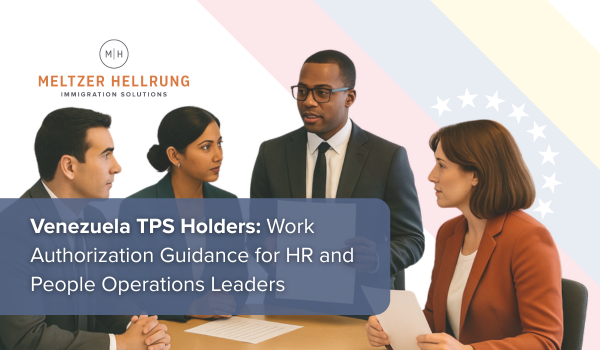Overview of TPS Termination
The Department of Homeland Security (DHS) has announced the termination of Temporary Protected Status (TPS) for Honduras and Nicaragua. Both designations officially ended on July 5, 2025, with a transition period concluding on September 8, 2025.
This change has significant implications for HR and People Operations teams managing corporate immigration support, Form I-9 compliance, and long-term workforce planning.
What Is Temporary Protected Status (TPS)?
Temporary Protected Status (TPS) allows nationals from designated countries affected by ongoing conflict or natural disasters to live and work temporarily in the U.S. Historically granted in 6 to 18-month increments, the TPS designations for Honduras and Nicaragua have often been extended. However, DHS has now decided to allow these TPS designations to expire, citing improved conditions in both countries.
While litigation has already challenged this decision, HR leaders should begin preparing immediately for the current timeline to remain in effect.
What This Means for Employers
Work Authorization Valid Through Transition Period
TPS beneficiaries from Honduras and Nicaragua remain authorized to work through the transition period, ending September 8, 2025. Employment Authorization Documents (EADs) for employees from both countries with the designation A12 or C19 and listing the following expiration dates will continue to serve as valid proof of work authorization:
Honduras:
January 5, 2018
July 5, 2018
January 5, 2020
January 4, 2021
October 4, 2021
December 31, 2022
June 30, 2024
July 5, 2025
Nicaragua:
January 5, 2018
January 5, 2019
April 2, 2019
January 2, 2020
January 4, 2021
October 4, 2021
December 31, 2022
June 30, 2024
July 5, 2025
Form I-9 Compliance: Reverification Required
Because the announcement terminating TPS was published after the prior expiration date of July 5, 2025, some companies may have terminated affected employees as of that date. HR departments may choose to rehire those employees and update their Forms I-9 using the extended authorization period as the updated expiration date, ensuring documentation reflects this status clearly. Staying ahead of Form I-9 compliance now can help prevent costly errors and audits down the line.
Corporate Immigration Support Strategies
Screen for Alternative Immigration Pathways
HR leaders should work closely with legal counsel to identify alternative immigration pathways for TPS employees who wish to remain in the U.S. Consider the following:
– Asylum, if the employee has a well-founded fear of persecution upon return to their home country
– Possible family-based immigration options if the employee has a U.S. citizen or lawful permanent resident relative
– H-1B process for high-skilled roles
– PERM labor certification for long-term sponsorship
– Other nonimmigrant or immigrant options suited to your workforce
Partner with Immigration Counsel
Companies should not navigate these transitions alone. Engage experienced immigration counsel to ensure accurate filings, minimize disruption, and maintain compliance.
How Meltzer Hellrung Can Help
Our team provides corporate immigration support tailored to HR and legal teams navigating complex policy changes. Whether it’s managing the H-1B process, guiding PERM filings, or staying ahead of Form I-9 compliance, we offer clear legal strategy and action plans to support your workforce.
For tailored guidance on TPS transitions or other employment-based immigration concerns, contact your designated Meltzer Hellrung attorney.


